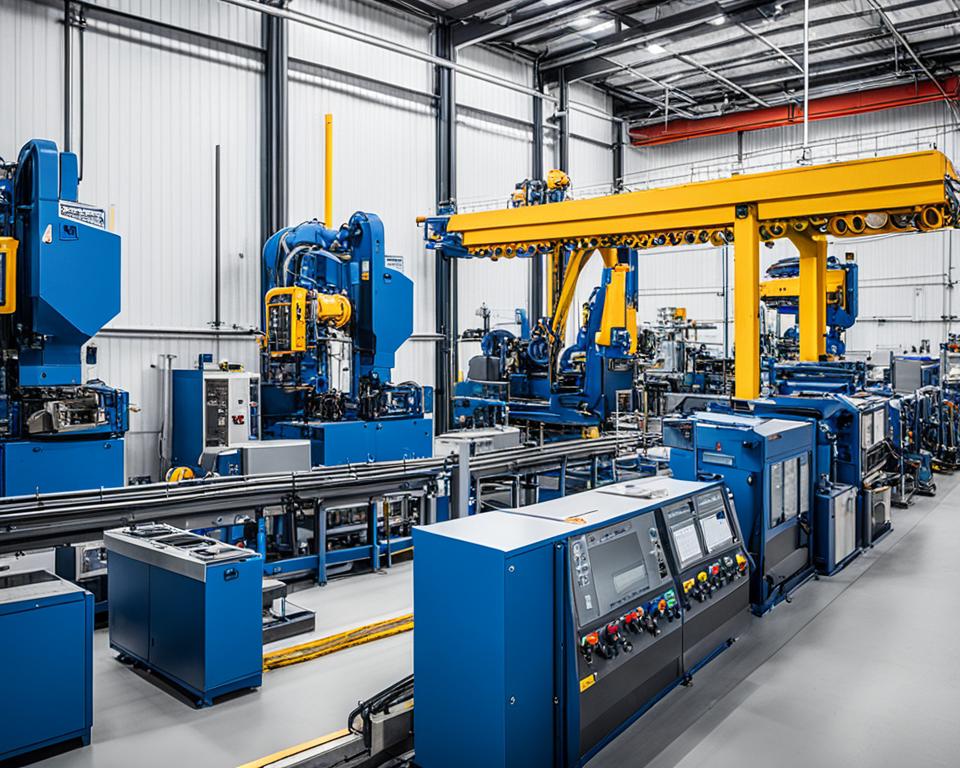For businesses to stay ahead, having top-notch equipment is key. But buying it all at once can be tough, especially for small and medium-sized companies. That’s where machinery loans step in, offering a way to get the gear you need without a huge upfront cost.
These loans let companies buy a variety of equipment. This includes everything from office gear to heavy machinery for industries like manufacturing and construction. You can even get loans for specific needs like medical or dental equipment.
Need medical or construction equipment? Machinery loans can cover it. By paying for your equipment over time, you keep your cash flow strong. Plus, you might get tax benefits that help your business grow.
Key Takeaways
- Machinery loans provide financing for a wide range of business equipment
- Equipment financing options include heavy equipment loans, farm machinery loans, and construction equipment loans
- Machinery loans allow businesses to preserve working capital and potentially benefit from tax advantages
- Businesses can finance medical equipment, commercial vehicles, phone systems, and computer hardware and software
- Spreading the cost of equipment over time makes it more affordable for small and medium-sized enterprises
Understanding Machinery Loans for Business Equipment Financing
Machinery loans help companies buy the tools and machinery they need. They are a type of asset-based lending, where the equipment is used as collateral. This way, businesses can get the equipment without using up all their working capital.
These loans are for buying a variety of equipment, like computers, vehicles, and big machinery. They make applying easy for purchases up to $200,000. Often, there’s no down payment needed, and repayment can be over 24 to 60 months or more.
One big plus of machinery loans is they let businesses pay for equipment over time. This makes it easier to get the tools needed without using all their money at once. It’s especially good for small and medium-sized businesses that can’t buy equipment upfront.
Machinery loans give businesses the chance to invest in growth without hurting their cash flow or efficiency.
When looking at machinery loans, it’s key to know what affects the loan terms. These factors include:
- The type and value of the equipment being financed
- The creditworthiness and financial stability of the borrower
- The length of the repayment term
- The interest rate and any associated fees
By looking at these factors and working with a good lender, businesses can get the equipment they need. This helps them stay competitive and succeed in their industries.
Types of Equipment Eligible for Machinery Loans
When looking into machinery loans for your business, it’s key to know what equipment you can finance. Machinery loans cover a wide range, from manufacturing and construction to agriculture and healthcare. They help you get the tools and equipment you need for your operations.
Manufacturing Equipment
With machinery loans, you can finance different types of manufacturing equipment. This includes heavy-industrial machinery like production lines, printing presses, and stationary machinery. These loans let manufacturers buy new equipment that boosts productivity and quality.
By getting financing for manufacturing equipment, businesses can stay competitive. They can also adapt to new industry trends.
Construction Machinery
Construction companies can use machinery loans to buy essential equipment. This includes things like excavators, bulldozers, and cranes. These loans help contractors get the machinery they need for big projects and growing their business.
With modern, reliable construction machinery, businesses can work more efficiently. They can also meet deadlines.
Agricultural Equipment
Farm machinery loans help agricultural businesses buy a variety of equipment. This includes tractors, combines, and irrigation systems. These loans offer flexible financing options for farmers and ranchers.
By investing in new equipment, farmers can work smarter and save on labor costs. They can also improve their operations.
Medical and Dental Equipment
Medical and dental practices can also get machinery loans for specialized equipment. This includes X-ray machines, dental chairs, and surgical tools. These loans let healthcare professionals buy the latest technology.
This helps them provide better care and expand their services. By financing medical and dental equipment, practices can stay ahead in their fields.
| Equipment Type | Examples | Benefits |
|---|---|---|
| Manufacturing Equipment | Production lines, printing presses, stationary machinery | Enhance productivity, efficiency, and product quality |
| Construction Machinery | Excavators, bulldozers, cranes | Improve job site efficiency, take on larger projects |
| Agricultural Equipment | Tractors, combines, irrigation systems | Increase productivity, reduce labor costs, optimize operations |
| Medical and Dental Equipment | X-ray machines, dental chairs, surgical tools | Enhance patient care, expand service offerings, stay at the forefront of the field |
Machinery loans offer a flexible way to finance a wide range of equipment across different industries. Whether you need equipment for manufacturing, construction, agriculture, or healthcare, these loans can help. They let you get the tools you need to succeed in your business.
Benefits of Equipment Financing for Businesses
Equipment financing through machinery loans helps businesses buy essential assets without using all their cash. By using asset-based lending, companies can keep their working capital safe. They can also take advantage of tax benefits and get payment plans that fit their needs.
Preserve Working Capital
One big plus of machinery loans is not using up valuable working capital. The equipment acts as collateral for the loan. This lets companies use their cash for other important things like inventory, payroll, or marketing. This way, they can keep a good cash flow and invest in growth.
Tax Advantages
Financing equipment through loans can also save businesses money on taxes. The interest paid on these loans might be tax-deductible. Some companies can even get faster depreciation, which means writing off the asset sooner. These tax perks help businesses cut their tax bills and put the savings back into their operations.
Flexible Payment Options
Machinery loans let businesses pay back in ways that fit their cash flow. Lenders offer different payment plans like monthly, seasonal, or semiannual. This flexibility helps companies manage their money better. They can plan their payments to match when they make more money or spend less.
Equipment financing is a great choice for businesses in many fields. It helps them keep their cash, use tax benefits, and get flexible payment plans. This way, companies can get the machinery they need to improve their work, increase productivity, and stay ahead in the market.
How to Qualify for a Machinery Loan
When you’re looking for equipment financing for your business, knowing what lenders want is key. They look at your credit score, how long your business has been around, and your yearly earnings. These factors help them decide if you can get a machinery loan.
Your credit score is very important for getting a loan approved. Sites like Commercial Fleet Financing want your score to be in the 600s at least. A good credit score can get you better loan terms and rates.
Lenders also check how stable and successful your business is. Some want your business to be at least two years old. Others, like Taycor Financial, don’t have this rule. Showing a strong business history and steady earnings can make your loan application stronger.
How much you earn each year matters too. For example, Funding Circle needs you to make at least $400,000 a year. Bank of America says $250,000 is enough. Earning this much can help you get a machinery loan.
“Qualifying for equipment financing involves a comprehensive evaluation of your personal credit, business history, and financial performance. Lenders want to ensure that you have the ability to repay the loan and that your business is stable and growing.”
To make applying for a loan easier, collect these important documents:
- Business tax returns
- Personal tax returns
- Bank statements
- Financial statements (balance sheet and income statement)
- Equipment quotes or invoices
Having these documents ready can make the loan process faster. It shows you’re ready for the loan to potential lenders.
| Lender | Minimum Credit Score | Time in Business | Annual Revenue |
|---|---|---|---|
| Commercial Fleet Financing | 600s | – | – |
| Taycor Financial | – | No minimum | – |
| Funding Circle | – | – | $400,000 |
| Bank of America | – | – | $250,000 |
Knowing what lenders look for and getting your documents in order can boost your chances of getting the equipment financing your business needs. This can help your business grow and succeed.
Machinery Loan vs. Equipment Leasing: Which is Right for Your Business?
When getting equipment for your business, you can choose between machinery loans and equipment leasing. Each has its pros and cons. The best choice depends on your company’s needs and finances. Let’s explore both options to see which suits your business best.
Advantages of Machinery Loans
A machinery loan lets you borrow money to buy the equipment. You own the equipment and can deduct depreciation on taxes. These loans often need a down payment but can save money over time. The total cost of owning is usually less than leasing.
“Machinery loans allow businesses to invest in high-quality equipment that can improve productivity and profitability over time.” – Sarah Thompson, Small Business Finance Expert
Advantages of Equipment Leasing
Equipment leasing means renting the equipment for a set time. The lender owns the equipment, and you pay regular fees to use it. Leasing is great for businesses with limited cash, as it often doesn’t require a down payment. It also lets you update your equipment more often, keeping you ahead with the latest technology.
Here’s a look at the main differences between machinery loans and equipment leasing:
| Factor | Machinery Loan | Equipment Leasing |
|---|---|---|
| Ownership | Borrower owns the equipment | Lender owns the equipment |
| Down Payment | Typically required | Usually not required |
| Long-term Cost | Lower | Higher |
| Flexibility | Limited | Easier to upgrade equipment |
The choice between a machinery loan and leasing depends on your business’s cash flow, taxes, and equipment needs. It’s wise to talk to a financial advisor to see which option is best for your company.
Factors to Consider When Choosing a Machinery Loan Lender
When looking for commercial machinery loans, it’s key to look at several factors. This ensures you pick the best lender for your business. Think about interest rates, fees, repayment terms, funding speed, and the lender’s reputation. This helps you make a choice that’s good for your company’s finances.
Interest Rates and Fees
Interest rates and fees are crucial when picking a machinery loan lender. Look at offers from different lenders to find the best rates. A lower interest rate sounds good, but consider the loan’s total cost. This includes any fees, prepayment penalties, or other charges that affect your expenses.
Repayment Terms
Repayment terms vary a lot among lenders. It’s important to pick a loan with a schedule that fits your business’s cash flow and financial plans. Longer repayment terms mean lower monthly payments, which can be easier on your budget. But, longer terms also mean paying more interest over time. Think about what’s best for your business’s finances.
Funding Speed
How fast a lender can give you money is key, especially if you need equipment quickly. Some lenders offer same-day funding, while others take days or weeks. Pick a lender that meets your timeline. Remember, faster funding might cost more, so find a balance between speed and cost.
Lender Reputation and Customer Service
Looking into a lender’s reputation and customer service can give you clues about your experience. Search for lenders with happy customers and good reviews. Look for lenders that are responsive, clear, and helpful. A lender with great customer support can make things easier and less stressful, even if you run into problems.
“Partnering with a trusted finance provider like Electronica Finance Ltd can simplify the loan process and facilitate the purchase of machinery through EFL Connections.”
By looking at interest rates, fees, repayment terms, funding speed, and lender reputation, you can make a smart choice when picking a machinery loan lender. Take time to compare offers from various providers. Choose the one that fits your business’s financial needs and goals. With the right lender, you can get the financing you need to grow your business in today’s competitive market.
Calculating the Cost of a Machinery Loan
When looking into equipment financing for your business, knowing the cost of a machinery loan is key. The loan amount, interest rate, repayment term, and extra fees all affect the total cost. These factors are important for industrial machinery financing.
To figure out your monthly payment, use a loan calculator. It should include the loan amount, interest rate, and repayment term. This will show you how much you’ll need to set aside each month for your equipment financing.
- Origination fees
- Documentation fees
- Appraisal fees
- Prepayment penalties
These fees can increase the overall cost of your machinery loan. Make sure to ask your lender about any extra charges you might face.
According to a recent survey, 45% of small business owners cited unfavorable loan terms as a top challenge when seeking equipment financing.
We’ve made a sample table to help you compare different machinery loans:
| Loan Amount | Interest Rate | Repayment Term | Monthly Payment | Total Cost of Loan |
|---|---|---|---|---|
| $100,000 | 6% | 5 years | $1,933 | $115,980 |
| $100,000 | 8% | 7 years | $1,613 | $135,492 |
| $100,000 | 10% | 10 years | $1,322 | $158,640 |
The interest rate and repayment term greatly impact your monthly payment and the total cost. By looking at these factors and comparing rates and terms, you can make sure your machinery loan fits your budget. This will help your business grow.
How to Apply for a Machinery Loan
Applying for a machinery loan is easy and can help your business grow. Just follow these steps to make the process smoother and increase your chances of getting the financing you need.
Gather Required Documentation
Before you apply, collect all the needed documents. You’ll need:
- Business financial statements (balance sheet, income statement, cash flow statement)
- Tax returns (personal and business)
- Equipment quotes or invoices
- Business plan
- Ownership and legal structure documentation
Having these documents ready makes the application process faster. It also shows your business’s financial health to lenders.
Compare Lenders and Offers
With your documents ready, start looking for the best loan offers. Compare things like interest rates, repayment terms, and fees from different lenders. Look at online lenders and alternative providers too. They might offer better rates and terms than traditional banks.

| Factor | Description |
|---|---|
| Interest Rates | Look for competitive interest rates that fit your budget and repayment capacity. |
| Repayment Terms | Choose a lender that offers repayment terms aligned with your business’s cash flow and growth plans. |
| Fees | Consider all fees associated with the loan, such as origination fees, prepayment penalties, and late payment fees. |
| Funding Speed | If you need equipment financing quickly, opt for lenders with fast approval processes and quick funding timelines. |
Submit Your Application
After picking the best loan offer, it’s time to apply. Most lenders have online applications that are easy to use. You’ll need to provide some information, such as:
- Business and personal details
- Loan amount and purpose
- Collateral (if required)
- Supporting documentation (financial statements, tax returns, equipment quotes, etc.)
After you apply, the lender will review your info and decide. If approved, you’ll get the loan for your heavy equipment in a few days to a week, depending on the lender and your application’s complexity.
By following these steps and considering your options carefully, you can get the machinery financing your business needs. This will help you get the equipment you need and stay competitive in your industry.
Common Mistakes to Avoid When Financing Equipment
When looking for equipment financing, businesses need to be careful and informed. One big mistake is buying more equipment than you need or can pay for. Make sure you know what your company really needs and can handle financially before you agree to a loan.
Another mistake is just looking at monthly payments and not the total loan cost. Remember, lower payments might mean paying more over time. Think about the full cost of the loan, including interest and fees, before you decide.
Be careful of lenders offering very low interest rates. They might have hidden fees or bad terms. Always read everything carefully and ask questions to understand the loan agreement fully. Don’t sign anything without checking the details, or you might face unexpected problems later.
“The key to successful equipment purchase financing is to be well-informed, carefully assess your needs, and take the time to find the right lender with transparent terms and conditions.” – Emily Thompson, Financial Advisor at Weston Financial Group
Here are some tips to avoid these mistakes:
- Do a detailed check of what your business needs and can afford
- Look at offers from different lenders, including interest rates, fees, and repayment terms
- Make sure you understand all loan documents before you sign them
- Choose lenders known for being open and making customers happy
| Common Mistake | Consequence | Solution |
|---|---|---|
| Financing more equipment than needed | Unnecessary debt and financial strain | Assess business needs and financial capacity |
| Focusing only on monthly payments | Higher overall cost due to longer repayment period | Consider total cost of the loan, including interest and fees |
| Falling for extremely low interest rates | Hidden fees or unfavorable terms | Read the fine print and ask questions |
| Rushing into a loan agreement | Unpleasant surprises and financial consequences | Thoroughly review terms and conditions before signing |
By avoiding these mistakes and following good practices, businesses can get financing for equipment that helps them grow and succeed. This way, they won’t risk their financial health.
Success Stories: Businesses Thriving with Machinery Loans
Machinery loans have changed the game for businesses in many fields. They let companies buy the equipment they need to grow. This has helped construction firms, dental offices, and manufacturing companies thrive.
A construction company got a loan to buy a top-notch excavator. This move helped them take on bigger projects, boosting their revenue by 35%. With their new gear, they became a top choice for clients and built a solid reputation.
In healthcare, a dental practice was struggling with old equipment. They got a loan to upgrade, which led to a 20% jump in patient happiness. The new tools improved care quality and made things run smoother, letting them help more patients.
Manufacturing firms have also seen big wins with machinery loans. For instance, a company bought a new production line. This move increased their output by 50% and cut costs by 15%. It helped them meet demand, boost profits, and stay ahead in their field.
In agriculture, farm machinery loans have been key to modernizing and boosting productivity. Farmers who got these loans saw better crop yields and profits.
These stories show how machinery loans can transform a business. They give companies the tools and tech they need to grow, work better, and grab new chances in the market.
Alternative Financing Options for Equipment Purchases
Businesses looking to grow often consider more than just machinery loans for buying equipment. Options like SBA loans, business lines of credit, and equipment vendor financing are available. Each has its own benefits and things to think about.
SBA Loans
The Small Business Administration (SBA) offers the 7(a) loan program for equipment financing. These loans have competitive rates and longer payback times. They’re great for businesses wanting to invest in machinery. The SBA guarantees part of the loan, making it easier for businesses to get financing.
Business Lines of Credit
A business line of credit lets companies borrow money as needed, up to a set limit. It’s perfect for businesses needing ongoing capital for equipment. With this option, companies can seize opportunities without asking for a new loan each time. Only the borrowed amount is charged interest, making it a cost-effective way to manage finances.
Equipment Vendor Financing
Equipment makers and sellers often have their own financing plans. These plans can offer good rates and repayment terms. It’s especially useful for businesses that work closely with certain suppliers. They might get better terms through these programs.
Businesses can also look into other lending options, like those from specialized banks. For example, U.S. Bank’s practice finance team helps businesses with financing for things like office updates or moving. By exploring different financing options, businesses can find the best fit for their needs. This ensures they have the funds to buy assets that will help them succeed.
| Financing Option | Advantages | Considerations |
|---|---|---|
| SBA Loans | Competitive interest rates, longer repayment terms, government guarantee | Longer application process, collateral may be required |
| Business Lines of Credit | Flexibility, draw funds as needed, only pay interest on borrowed amount | Variable interest rates, may require strong credit score |
| Equipment Vendor Financing | Competitive rates, tailored repayment terms, established vendor relationships | Limited to specific equipment brands, may not offer the most competitive rates |
The Future of Machinery Loans and Equipment Financing
Technology is changing fast, and businesses need new equipment to stay ahead. This means they’ll look for easy and flexible ways to get Industrial Machinery Financing. Lenders will offer more flexible repayment plans and quick access to funds to meet these needs.
Online lending platforms and simpler application processes will help companies get the financing they need. These platforms use digital tools and data to offer solutions that fit each business’s needs. This will make it easier for businesses to invest in the latest equipment, making them more productive and profitable.
The future of Commercial Machinery Loans is set to grow and change a lot. Businesses will need to quickly get the equipment they need through flexible financing. Lenders that understand these needs and use new technology will be key to helping businesses grow and stay strong in their fields.







